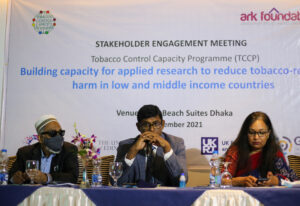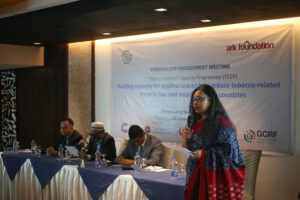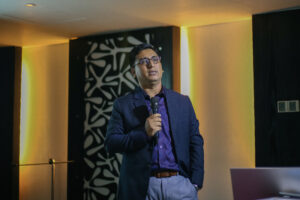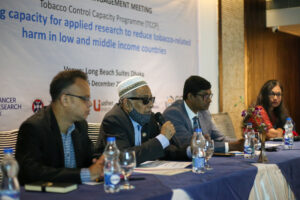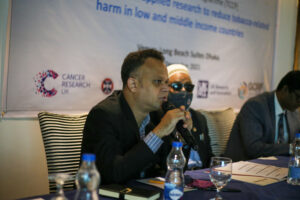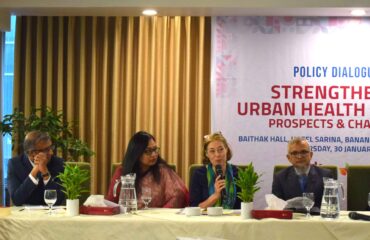Bangladesh has one of the largest populations of tobacco users in the world, with 37.8 million adults consuming tobacco products. Although the overall prevalence of tobacco use among adults declined from 43.3 percent to 35.3 percent between 2009 and 2017, the rate of cigarette smoking remains alarmingly high, with no change observed during that period. According to the Global Adult Tobacco Survey (GATS) 2017, cigarette smoking prevalence stands at 14 percent among adults and 28.7 percent among men. The high prevalence of tobacco use, particularly cigarette smoking, remains a significant public health concern for Bangladesh.
In light of this, Ark Foundation, Bangladesh, with the support of the Tobacco Control Capacity Program (TCCP), has been actively engaged in generating knowledge and evidence to advocate for stronger tobacco control policies. On December 26, Ark Foundation organized a stakeholder consultation meeting aimed at enhancing research capacity to reduce tobacco-related harm in low- and middle-income countries. The meeting, conducted under the guidance of the Global Challenges Research Fund’s Tobacco Control Capacity Program, facilitated discussions on two key research themes: the illicit trade of tobacco in Bangladesh and the implementation of Article 5.3 of the Framework Convention on Tobacco Control (FCTC).
During the meeting, a research paper on tobacco industry interference was presented by Dr. Rumana Haque, Executive Director of Ark Foundation and Professor of Economics at Dhaka University. She highlighted that a majority of participants in the research believed the government’s stake in tobacco companies poses a significant barrier to effective tobacco control. Dr. Haque emphasized the urgent need for swift implementation of Article 5.3 and strengthening the capacity of implementing agencies to combat the influence of tobacco companies.
Another research paper on the illicit production and sale of cigarettes was presented by S.M. Abdullah, Associate Professor of Economics at Dhaka University and researcher at Ark Foundation. His findings revealed that approximately 5.2 percent of cigarettes sold in retail stores in Bangladesh violate tobacco control laws related to packaging. He also addressed the common claim by tobacco companies that higher taxes would increase illicit trade, which his research disproved, showing that despite annual price increases, the prevalence of illicit cigarettes in Bangladesh remains minimal.
The workshop provided an opportunity to circulate these findings and discuss possible interventions to reduce the illicit trade of tobacco products. The event was attended by policymakers, health experts, development workers, academicians, policy advocates, and youth, who underscored the importance of implementing evidence-based policies to reduce illicit trade and industry interference. Special guest speakers included Dr. Nasir Uddin Ahmed, former Chairman of the National Board of Revenue; Dr. Md. Nurul Amin, Director (Research) of the Health Economics Unit; and Advocate Syed Mahbubul Alam Tahin, Secretary of the Center for Law and Policy Affairs.
The participants called for strengthened cooperation among all stakeholders to tackle the challenges posed by the tobacco industry and recommended more robust implementation of policies to achieve a tobacco-free Bangladesh by 2041. The consensus from the meeting reinforced the need for sustained efforts and collective action to combat the pervasive influence of the tobacco industry and illicit trade, marking a critical step towards a healthier future for Bangladesh.

